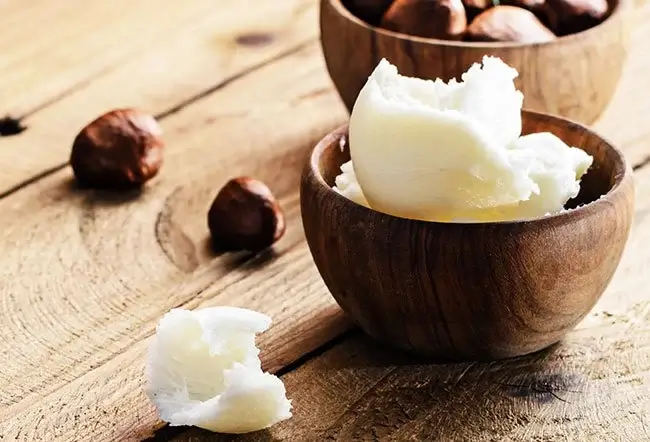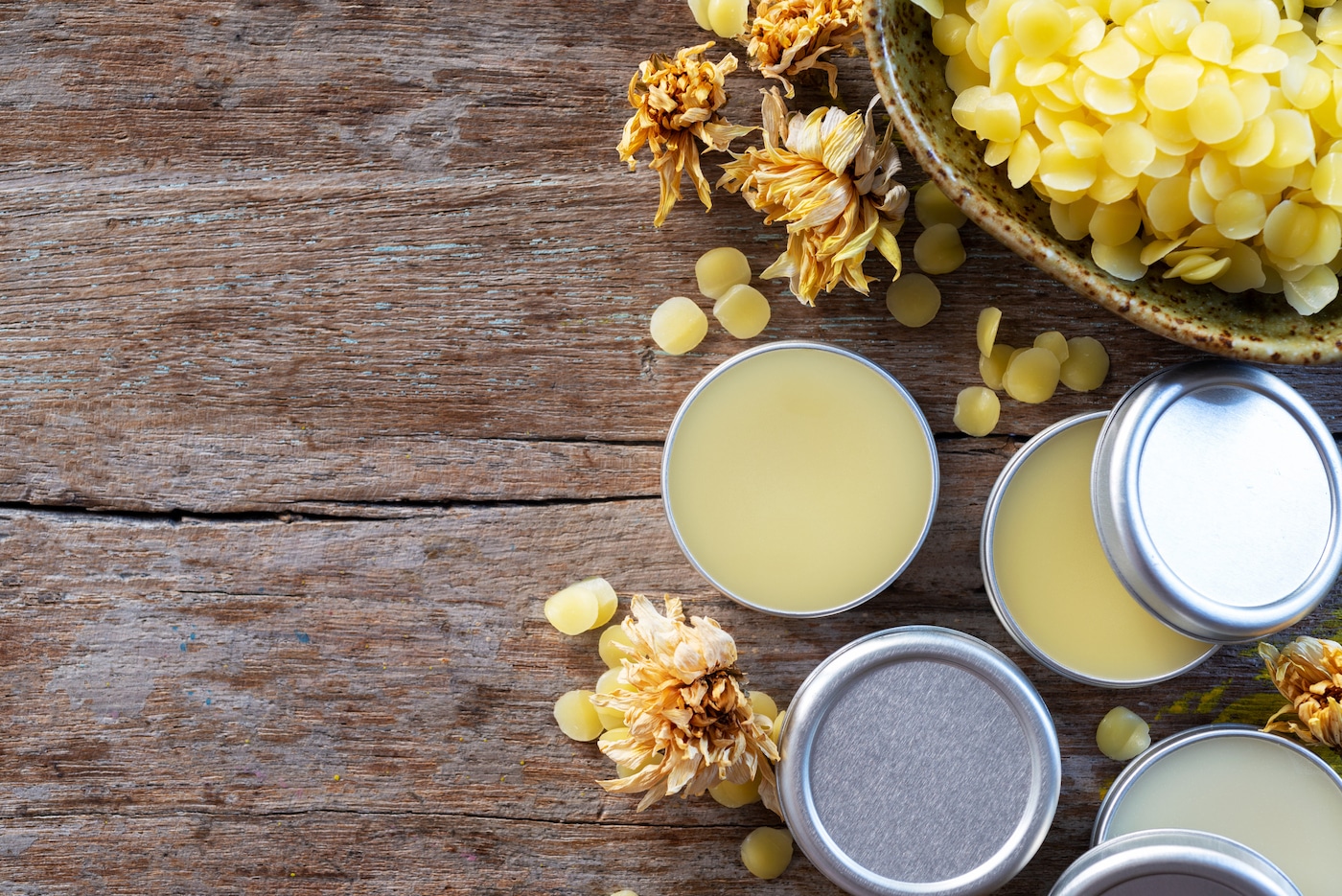Our skin is an essential body part that deserves to work with the safest and most beneficial ingredients. That’s why it’s always paramount to scrutinize every element in a skincare product before applying it to our skin.
In this blog post, we look in-depth at Shea butter and beeswax to find out what they are and how best to use them.
Shea Butter

Shea butter ingredient is a fat that’s extracted from the nuts of the Shea or Karite trees, native to West Africa. Since immemorial, the Shea butter ingredient has been used in most skin care products, attributed to its high concentration of fatty acids and vitamins. It’s also worth noting that this property has an easy-to-spread consistency, making it a favorite among many beauty enthusiasts.
Shea butter is also highly recommended for its usability on all skin types. Besides originating from nut trees, this property contains deficient levels of proteins that could otherwise cause allergic reactions. Shea butter does not have harmful combinations known to clog your pores or cause breakouts. Some of the best Shea butter skincare products in the market today include glossier priming moisturizer, nude skin nudestix hydra-peptide lip butter, sun potion skin food Shea butter, and GrandePOUT Plumping Lip Mask.
Benefits of Using Shea Butter in Your Skin Care Routine
There are many benefits of using Shea butter in your skincare routine as follows;
Absorbs Easily into the Skin
One outstanding attribute of Shea butter is that it absorbs seamlessly into your skin without leaving any residue. The high levels of oleic acid and linoleic acid in this ingredient balance each other out, allowing the property to apply easily to your skin.
Shea Butter Has Antibacterial Properties
It’s natural to want to work with skincare products that contain antibacterial properties in them. The antibacterial properties in skin care products help keep the skin glowing and healthy by fighting germs that could interfere with it. Shea butter is known to aid in clearing acne and other skin blemishes, such as discoloration.
Shea Butter Helps Reverse Signs Of Aging
Shea butter composition contains triterpenes, a naturally occurring chemical known to aid in deactivating collagen fiber destruction. This results in high levels of collagen that aid in minimizing fine lines, wrinkles, and other aging signs.
It Has Anti-Inflammatory Benefits
Applying Shea butter to your skin will help minimize irritation caused by inflammatory skin conditions such as eczema and adverse effects from environmental factors. Shea butter slows the production rate of cytokines and other inflammatory cells on your skin.
Beeswax

Photo by wellandgood.com
Beeswax is a wax offered by the bees. This ingredient has been used in skincare products since time memorial. Today you will find beeswax in almost all makeup products, baby products, sunscreen, and other cosmetics. Beeswax is naturally an exfoliator that aids in shedding dead skin cells from your skin. This ingredient is also a humectant that helps draw moisture into the skin, keeping it hydrated and glowing.
You can also use beeswax to treat varying skin conditions such as burns, eczema, and different types of wounds. This ingredient is good for your skin as it’s naturally sourced and contains very few chemicals. When including beeswax in your skincare routine, you can either buy products with the ingredient or mix it yourself at home to use as a lotion or lip balm.
Some bestselling beeswax-contained skincare products include PCA skin Hyaluronic acid boosting serum, Avene cicalfate+ restorative, protective cream, and SkinCeuticals anti-aging system. Whichever direction you decide to take, always be on the lookout, as this ingredient could easily cause an allergic reaction. To rule out any adverse effects when using this product, take time to do a patch test and always wash your face before going to sleep after applying the beeswax-containing product.
Benefits of Using Beeswax in Your Skincare Routine
It Has Moisturizing Properties that Helps Hydrate Dry Skin
Beeswax is naturally a humectant that helps draw in moisture and lock it into your skin. This results in well-hydrated skin that can withstand different environmental factors.
Beeswax Has Antibacterial and Anti-Inflammatory Properties
If you are after mild skincare products that will help solve your unending acne, beeswax-containing products are the ones to go for. Beeswax contains anti-inflammatory and antibacterial properties that work together to soothe irritated skin, keep away germs and clear out acne. When using beeswax to treat acne, the primary consideration is to use it sparingly and always do a patch test beforehand to ensure the chosen product is right for you.
Helps Treat Chapped Lips
Beeswax is popularly known to aid in treating and healing chapped lips. The hydrating and soothing properties of beeswax work together to hydrate the lips and provide a calming sensation as your lips heal.
Shea Butter vs. Beeswax: Comparison
These two formulas have antibacterial properties that help keep your skin healthy by preventing infections. What’s more, these two ingredients are used as product thickeners in many DIY skincare products. These two ingredients are also great humectants that aid in keeping the skin hydrated and moisturized. While beeswax is a humectant in nature, the Shea butter ingredient helps keep the cellular membranes healthy, preventing water loss from the skin.
Shea Butter vs. Beeswax: What’s The Difference?
The number one difference between Shea butter and beeswax is that while Shea butter is oil, beeswax is a wax secreted from honeybees’ glands. On the other hand, shea butter is derived from the karite tree or the nuts of the Shea nut tree.
Beeswax is generally an outstanding humectant that works to draw water from the atmosphere to itself. Shea butter, on the contrary, is enriched with fatty acids that aid in the skin cell-building process and keep the cellular membranes healthy and flexible.
Which One Is Better for You Between Shea Butter and Beeswax, and Can You Substitute One For The Other?
As shown above, each ingredient has specific compositions and strengths. What Shea butter can do better is not what beeswax can do better. As such, you must ensure to use the ingredients for their intended purpose, and never at one time should you substitute one for the other. Using Shea butter instead of beeswax in your DIY lotion-making process will not yield the expected results as the two properties are entirely different.
The good thing about these two ingredients is that you can get them in almost all skincare products or decide to make the products yourself at home. To know which is right for you, conversate with your skin type and needs. Also, read previous customer reviews to get their suggestions on how the said products worked on them.
Whatever route you choose to follow, always ensure to do a patch test before applying the product to a large part of your skin to rule out any adverse allergic reaction.
